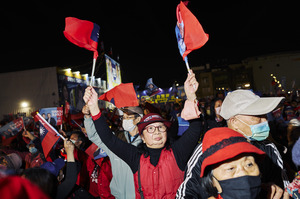
TAIPEI, Taiwan — Amid a dazzling display of color and theatrics, Taiwan, the only Chinese-language democracy, is preparing to elect a new president this weekend. This is only the eighth democratic presidential election in the island's modern history, so Taiwanese people cherish the right to vote.
Campaign rallies are almost theatrical. Musicians are often hired to score candidate's stump speeches in real time, so as they reach particularly emotional moments the music swells to intensify the audience reactions.
In many instances, the musician is the most important person at the rally — besides the candidates, of course — for one simple reason: they provide the emotion.
At one rally for the Kuomintang (KMT) party, thousands of people gather at Dajia Riverside Park to cheer on candidate Hou Yu-ih. The atmosphere is loud and raucous, and the crowd is a sea of KMT flags.



One woman, who calls herself Ji Dong Jie — or "excited sister" in Mandarin — is clearly a fixture on the rally circuit. She is dressed in a bright red pantsuit, sparkly Mylar boas and rhinestone-studded heels. Her huge fluffy pink hat is adorned with two Taiwanese flags that wave in the air as she leads the crowd in an impromptu dance.
"It's all DIY," she tells NPR in Mandarin, adding that she goes to every KMT rally. "I want the KMT to work for peace. I don't want independence for Taiwan. I want relations with the U.S. to be good, and I want relations with China to be good. We're all one family."

Meanwhile, campaign events hosted by the rival Democratic Progressive Party (DPP) are generally quieter, but no less festive. The current DPP Vice President, Lai Ching-te (also known as William Lai) is running to be the island's new president and is favored to win.
At one reelection rally for a DPP legislator named Su Chiao-hui, volunteers dress in bright green vests and hand out steaming, fresh baoand campaign souvenirs. Other candidates take photos with supporters, and current president Tsai Ing-wen even makes an appearance to show her support.
Voters at the DPP rally sit on stools organized in neat rows, many wearing white baseball caps with Su's name emblazoned on the front.
As part of their campaigns, legislative and presidential candidates often ride in caravans through their districts, standing on open truck beds to wave to their constituents for hours at a time.



Over loudspeakers, Su calls out her thanks to people who voted for her, and occasionally bursts into song. Her supporters cheer and wave from street corners and doorways, holding flags and giving her two thumbs up.
Su says she's wearing a bright pink vest (her campaign color) because she looks good in it and it flatters her skin, even when she isn't wearing any makeup.
Posters of presidential candidates and their running mates can be seen everywhere in Taipei – indeed, throughout the island – on billboards, street lamps and the sides of buildings.
The celebratory nature of campaigning in Taiwan does not mean that people on the island aren't taking the election seriously. As every election approaches, the issue of China takes center stage.



Broadly speaking, both the DPP and KMT favor maintaining the status quo between Taiwan and China and both would like Taiwan to remain self-governed, even if it is not formally independent.
People on the island are also worried about low wages and the growing cost of living. Some believe the DPP hasn't paid enough attention to the economy over the past eight years of President Tsai's administration.
Many younger voters feel disillusioned with both the DPP and the KMT, and have flocked to Ko Wen-Je, a third-party candidate on the ballot this year, representing the Taiwan People's Party, or TPP.
As Taiwanese people prepare to head to voting stations on Saturday, the outcome — and the future of the island — remains to be seen.







